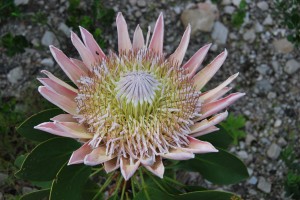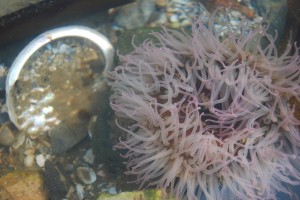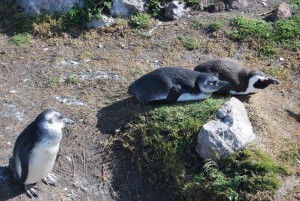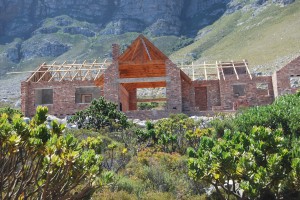 According to the Climate and Development Knowledge Network (CDKN) atmospheric carbon dioxide concentrations are now at 400 parts per million (ppm) and scientists have estimated that keeping the mean temperature rise between 2 degrees centigrade and 2.8 degrees centigrade will require the stabilisation of atmospheric carbon dioxide at between 445 ppm and 490 ppm. Although still catastrophic for vast numbers of people, fauna and flora species and marine and terrestrial ecosystems around the world, it is hoped that this limit will keep the global climate from crossing a dangerous threshold. What would a seemingly small increase of “degree days” mean for us, keeping in mind that the danger lies not in a 2°C increase but in the cumulative effect of 365 days at an increase of 2°C?
According to the Climate and Development Knowledge Network (CDKN) atmospheric carbon dioxide concentrations are now at 400 parts per million (ppm) and scientists have estimated that keeping the mean temperature rise between 2 degrees centigrade and 2.8 degrees centigrade will require the stabilisation of atmospheric carbon dioxide at between 445 ppm and 490 ppm. Although still catastrophic for vast numbers of people, fauna and flora species and marine and terrestrial ecosystems around the world, it is hoped that this limit will keep the global climate from crossing a dangerous threshold. What would a seemingly small increase of “degree days” mean for us, keeping in mind that the danger lies not in a 2°C increase but in the cumulative effect of 365 days at an increase of 2°C?
At 1°C of warming there will be changes in global ecology and changed weather patterns, with droughts in some parts of the world and severe winter blizzards in others. There will be changed agricultural zones and changes in vector ecologies with a recombination of microbes.
At 2°C of warming (which we are committed to regardless of current mitigation measures) we will have reached the point at which some of the larger human impacts and critical positive feedback loops are expected to begin with the crossing of thresholds or tipping points.
At 3°C of warming which is five times the warming of today climatic zones will move rapidly with species’ dislocations of connection and catastrophic weather extremes as the global weather machine adjusts to “boundary conditions”.
4 or more degrees centigrade of warming is beyond imagining …
 According to ocean warrior, Paul Watson, “future generations won’t have any respect for cultures like ours that have diminished their world”. He also says that “all social change comes from the passion and intervention of a few individuals or small groups of individuals. Slavery wasn’t ended by any government or any institution; women got the right to vote not because of any government; the same with the civil rights movement and the ending of apartheid. It was individuals like Gandhi and Mandela who made the difference. We need individuals with the passion and energy to get involved. That’s where I see some optimism. That’s where some results are happening”.
According to ocean warrior, Paul Watson, “future generations won’t have any respect for cultures like ours that have diminished their world”. He also says that “all social change comes from the passion and intervention of a few individuals or small groups of individuals. Slavery wasn’t ended by any government or any institution; women got the right to vote not because of any government; the same with the civil rights movement and the ending of apartheid. It was individuals like Gandhi and Mandela who made the difference. We need individuals with the passion and energy to get involved. That’s where I see some optimism. That’s where some results are happening”. < African penguins at the Stony Point colony in Betty's Bay in the Western Cape[/caption]It's wonderful to hear good news stories and even more so when these stories centre around conservation. Tuna longline fleets and the trawl fishery have been responsible for massive seabird population decreases on a worldwide basis with around 300 000 seabirds being caught each year as bycatch - longlines can extend for over 100 kms with 2 000 to 3 000 baited hooks with fishing going on 22 to 24 hours a day.
In 2006 South Africa became the first country to establish an Albatross Task Force (ATF) team with Argentina, Brazil, Chile, Ecuador, Namibia and Uruguay following suit. The SA ATF team has effectively reduced the hooking of albatross by South African longlining fleets from around 12 000 to 16 000 birds a year to "low hundreds". There has also been a more than 80% reduction in the catching of seabirds from trawl fleets in SA waters, which is indeed a good news story. Well done to BirdLife South Africa.
The African penguin is one of only two seabirds that breed along the South African coast that have been listed globally Endangered by Birdlife International. In the 1950s there were around 150 000 pairs of African penguin in South Africa, however this number has since dropped to 20 000 pairs with one of the reasons for the decline being that African penguins are specialists who only eat anchovies and sardines and these fisheries have declined on the west coast, having shifted to the south coast. The Stony Point colony at Betty’s Bay, however, which numbers around 1 000 breeding pairs is doing well with numbers increasing – another good news story!
< African penguins at the Stony Point colony in Betty's Bay in the Western Cape[/caption]It's wonderful to hear good news stories and even more so when these stories centre around conservation. Tuna longline fleets and the trawl fishery have been responsible for massive seabird population decreases on a worldwide basis with around 300 000 seabirds being caught each year as bycatch - longlines can extend for over 100 kms with 2 000 to 3 000 baited hooks with fishing going on 22 to 24 hours a day.
In 2006 South Africa became the first country to establish an Albatross Task Force (ATF) team with Argentina, Brazil, Chile, Ecuador, Namibia and Uruguay following suit. The SA ATF team has effectively reduced the hooking of albatross by South African longlining fleets from around 12 000 to 16 000 birds a year to "low hundreds". There has also been a more than 80% reduction in the catching of seabirds from trawl fleets in SA waters, which is indeed a good news story. Well done to BirdLife South Africa.
The African penguin is one of only two seabirds that breed along the South African coast that have been listed globally Endangered by Birdlife International. In the 1950s there were around 150 000 pairs of African penguin in South Africa, however this number has since dropped to 20 000 pairs with one of the reasons for the decline being that African penguins are specialists who only eat anchovies and sardines and these fisheries have declined on the west coast, having shifted to the south coast. The Stony Point colony at Betty’s Bay, however, which numbers around 1 000 breeding pairs is doing well with numbers increasing – another good news story! < Building in Betty's Bay[/caption]This has been a ten-year period of intense work during which I, amongst other projects, relocated to Cape Town from Johannesburg, published “Miracles of Hope: Surviving and Thriving in the 21st Century” as a wake-up call for people; researched, wrote, marketed and published over 30 broadsheets on sustainability, emerging trends and corporate leadership in the Cape Argus and Cape Times, the Western Cape’s foremost daily newspapers; and sustainably owner-built and moved into a house in Betty’s Bay (during which I was way too busy to blog). This new phase will be about intentionally creating a new future in one of the world’s most beautiful and inspiring places …
< Building in Betty's Bay[/caption]This has been a ten-year period of intense work during which I, amongst other projects, relocated to Cape Town from Johannesburg, published “Miracles of Hope: Surviving and Thriving in the 21st Century” as a wake-up call for people; researched, wrote, marketed and published over 30 broadsheets on sustainability, emerging trends and corporate leadership in the Cape Argus and Cape Times, the Western Cape’s foremost daily newspapers; and sustainably owner-built and moved into a house in Betty’s Bay (during which I was way too busy to blog). This new phase will be about intentionally creating a new future in one of the world’s most beautiful and inspiring places …